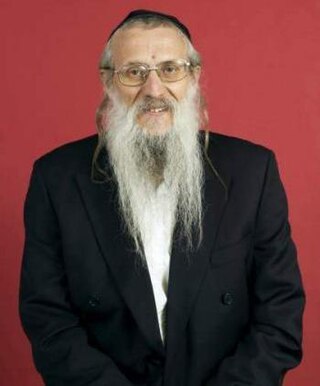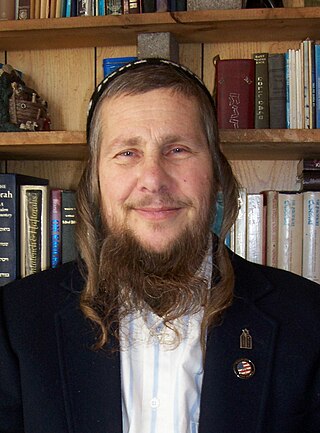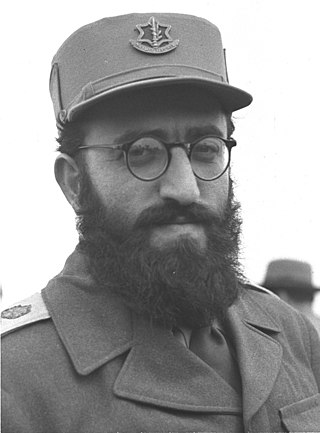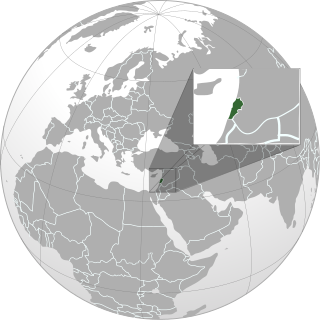
Agudath Israel of America is an American organization that represents Haredi Orthodox Jews. It is loosely affiliated with the international World Agudath Israel. Agudah seeks to meet the needs of the Haredi community, advocates for its religious and civil rights, and services its constituents through charitable, educational, and social service projects across North America.

Religious Zionism is an ideology that views Zionism as a fundamental component of Orthodox Judaism. Its adherents are also referred to as Dati Leumi, and in Israel, they are most commonly known by the plural form of the first part of that term: Datiim. The community is sometimes called 'Knitted kippah', the typical head covering worn by male adherents to Religious Zionism.

Yosef Mendelevitch, was a refusenik from the former Soviet Union, also known as a "Prisoner of Zion" and now a politically unaffiliated rabbi living in Jerusalem who gained fame for his adherence to Judaism and public attempts to emigrate to Israel at a time when it was against the law in the USSR.

Joseph Leftwich, born Joseph Lefkowitz, was a British critic and translator into English of Yiddish literature.

Roberta Kalechofsky was an American writer, feminist and animal rights activist, focusing on the issue of animal rights within Judaism and the promotion of vegetarianism within the Jewish community. She was the founder of Jews for Animal Rights and Micah Publications or Micah Books, which specializes in the publication of animal rights, Jewish vegetarian, and Holocaust literature.

Richard H. Schwartz is a professor emeritus of mathematics at the College of Staten Island; president emeritus of the Jewish Vegetarians of North America (JVNA); and co-founder and coordinator of the Society of Ethical and Religious Vegetarians (SERV). He is best known as a Jewish vegetarian activist and advocate for animal rights in the United States and Israel.

The practice of vegetarianism is strongly linked with a number of religious traditions worldwide. These include religions that originated in India, such as Hinduism, Jainism, Buddhism, and Sikhism. With close to 85% of India's billion-plus population practicing these religions, India remains the country with the highest number of vegetarians in the world.

Yonassan Gershom is a Rabbi and writer who was ordained in the Jewish Renewal movement during the 1980s, and is now a follower of Breslov Hasidism. He was associated with the early days of the B'nai Or movement, a forerunner of Jewish Renewal, in which he was ordained by Rabbi Zalman Schachter-Shalomi in 1986, although he is not in agreement with the direction that the movement has taken in more recent years.

Shlomo Goren, was a Polish-born Israeli Orthodox Religious Zionist rabbi and Talmudic scholar who was considered a foremost authority on Jewish law (Halakha). Goren founded and served as the first head of the Military Rabbinate of the Israel Defense Forces (IDF). Subsequently, he served as Chief Rabbi of Tel Aviv–Jaffa between 1968 and his 1972 election as Israel's third Ashkenazic Chief Rabbi. After his 1983 retirement from the Chief Rabbinate, Goren served as the head of a Jerusalem yeshiva he established.
Reform Zionism, also known as Progressive Zionism, is the ideology of the Zionist arm of the Reform or Progressive branch of Judaism. The Association of Reform Zionists of America is the American Reform movement's Zionist organization. Their mission “endeavors to make Israel fundamental to the sacred lives and Jewish identity of Reform Jews. As a Zionist organization, the association champions activities that further enhance Israel as a pluralistic, just and democratic Jewish state.” In Israel, Reform Zionism is associated with the Israel Movement for Progressive Judaism.

From the founding of political Zionism in the 1890s, Haredi Jewish leaders voiced objections to its secular orientation, and before the establishment of the State of Israel, the vast majority of Haredi Jews were opposed to Zionism, like early Reform Judaism, but with own reson. This was chiefly due to the concern that secular nationalism would redefine the Jewish nation from a religious community based in their alliance to God for whom adherence to religious laws were “the essence of the nation’s task, purpose, and right to exists,” to an ethnic group like any other as well as the view that it was forbidden for the Jews to re-constitute Jewish rule in the Land of Israel before the arrival of the Messiah. Those rabbis who did support Jewish resettlement in Palestine in the late 19th century had no intention to conquer Palestine and declare its independence from the rule of the Ottoman Turks, and some preferred that only observant Jews be allowed to settle there.

The history of the Jews in Lebanon encompasses the presence of Jews in present-day Lebanon stretching back to biblical times. Following large-scale emigration following the 1948 Arab–Israeli War, and much more importantly the Lebanese Civil War, the vast majority of Lebanese Jews now live in Western countries and many live in Israel. As the latest census in Lebanon was conducted in 1932, there are virtually no statistics available. In 2006, there were about 40 Jews in Lebanon, whereas in 2020 there were only about 29 Jews in Lebanon. Reports indicate that in 2022 the number of Jews in Lebanon was 27 to 20.
Judaism and environmentalism intersect on many levels. The natural world plays a central role in Jewish law, literature, liturgical, and other practices. Within the arena of Jewish thought, beliefs vary widely about the human relation to the environment.
The Green Party, formerly the Green Movement, is a social-environmental movement and political party in Israel. After briefly considering running independently in the 2020 Israeli legislative election, the party decided against it, realizing they had little to no chance of passing the 3.25% threshold needed to enter the Knesset. Stav Shaffir, the party's leader, urged supporters to vote for a left leaning party to help defeat Benjamin Netanyahu.
The American Council for Judaism (ACJ) is an organization of American Jews committed to the proposition that Jews are not a national but a religious group, adhering to the original stated principles of Reform Judaism, as articulated in the 1885 Pittsburgh Platform. In particular, it is notable for its historical opposition to Zionism. Although it has since moderated its stance on the issue, it still advocates that American Jews distance themselves from Israel politically, and does not view Israel as a universal Jewish homeland. The ACJ has also championed women's rights, including the right for women to serve as rabbis, and has supported Reform Jewish congregations and contributed to the publication of new editions of prayer books for religious services predominately in the English language for Jews in English-speaking countries.
Tza'ar ba'alei chayim, literally "suffering of living creatures", is a Jewish commandment which bans causing animals unnecessary suffering. This concept is not clearly enunciated in the written Torah, but was accepted by the Talmud as being a biblical mandate. It is linked in the Talmud from the biblical law requiring people to assist in unloading burdens from animals.
Jewish Veg is an international 501(c)(3) charitable organization whose mission is to encourage and help Jews to embrace plant-based diets as an expression of the Jewish values of compassion for animals, concern for health, and care for the environment. Jewish Veg was formerly called Jewish Vegetarians of North America (JVNA) and, prior to that, the Jewish Vegetarian Society of America.
Jewish vegetarianism is a commitment to vegetarianism that is connected to Judaism, Jewish ethics or Jewish identity. Jewish vegetarians often cite Jewish principles regarding animal welfare, environmental ethics, moral character, and health as reasons for adopting a vegetarian or vegan diet.
Aytzim, formerly the Green Zionist Alliance (GZA), is a New York-based Jewish environmental organization that is a U.S.-registered 501(c)(3) tax-deductible nonprofit charity. A grassroots all-volunteer organization, Aytzim is active in the United States, Canada and Israel. The organization is a former member of the American Zionist Movement and has worked in partnership with Ameinu, the Coalition on the Environment and Jewish Life (COEJL), Hazon, Interfaith Moral Action on Climate, Interfaith Oceans, GreenFaith, Mercaz/Masorti, the National Religious Coalition on Creation Care, and the Jewish National Fund (JNF)—although Aytzim has long criticized JNF for not prioritizing sustainability and environmental justice in its actions. Aytzim's work at the nexus of Judaism, environmentalism and Zionism has courted controversy from both Jewish and non-Jewish groups.











